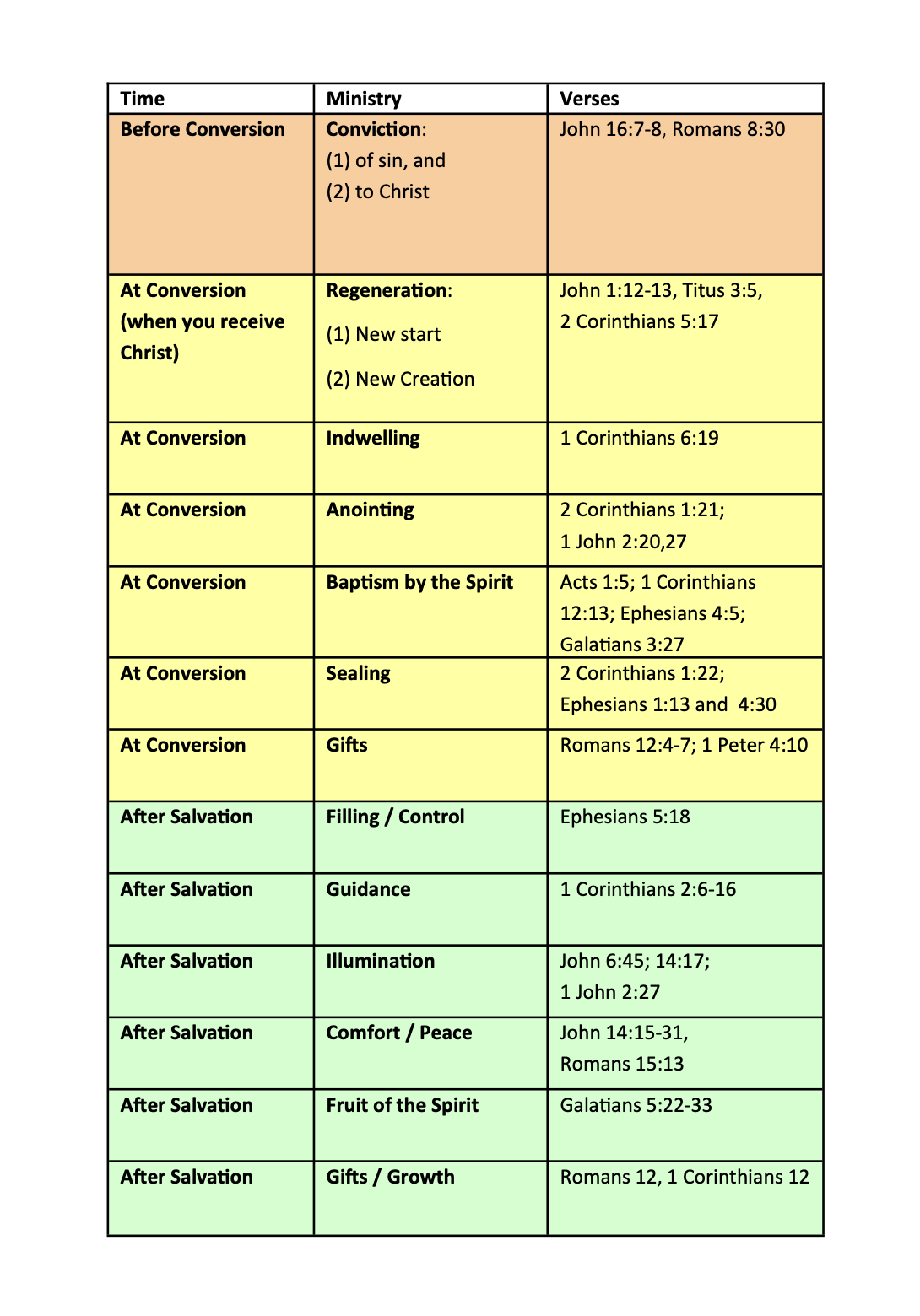
There are many misconceptions about this member of the Trinity. The Holy Spirit is seen in Scripture as the third person of the Trinitarian God. Matthew 28:19-20 makes that clear as we baptize in the name of the Father, Son and Holy Spirit. The Holy Spirit is not merely an influence or impersonal force, but rather a person. Romans 8:26-27 says that the Spirit helps us in our weakness and prays on our behalf. The Holy Spirit possesses and exhibits the attributes of a person as He has intelligence
(1 Corinthians 2:10-11, Romans 8:27, 1 Corinthians 2:13), He shows feelings (Ephesians 4:30), He has a will (1 Corinthians 12:11, Acts 16:6- 11), He guides into truth (John 16:13), He convicts of sin (John 16:8), He performs miracles (Acts 8:39). The Holy Spirit also has attributes which belong to God alone such as Omniscience (Isaiah 40:13, 1 Corinthians 2:12), Omnipresence (Psalm 139:7) and Omnipotence (Job 33:4, Psalm 104:30). Over the course of this series study guide, our desire will be to better know the Holy Spirit so that we can be better lead by Him!
If you don’t have a bible of your own, or yours is a different version that what we use at Grace, we invite you to take a Bible from a seatback pocket in the auditorium—our gift to you!
The Holy Spirit is God
The Bible declares that the Holy Spirit is God: a divine person with a mind, emotions and will. God is of one essence existing in three persons. God is one (Deuteronomy 6:4, Mark 12:29, 1 Timothy 2:5, 1 Corinthians 8:4.) God also exists as three persons. The Father is not the Holy Spirit, the Holy Spirit is not Jesus, Jesus is not the Father, yet they are one (John 10:30, 17:11). The three persons of the Trinity work together in complete harmony and unison to accomplish the work of God as seen in creation and the baptism of Jesus and salvation (Genesis 1, Matthew 3:16-17, Luke 3:21-22). There is a particular story in the book of the Acts that we will look at today that provides further evidence for the Holy Spirit as God.
Q: What comes to your mind when you think of the Holy Spirit?
Read Acts 1:8
Q: Whom did Jesus promise to send in order to assist them in being His witnesses to here, there and everywhere? At what point does it come upon those who confess and believe in Jesus Christ? What words are used to describe the Holy Spirit’s arrival into someone’s life?
Q: How would you respond scripturally to someone that said that the Holy Spirit is just an impersonal force?
Q: How does that the fact that the Holy Spirit is a person and not simply a force help you relate in a personal way to God?
Read Acts 5:1-11
Q: What do we learn about the Holy Spirit from this passage?
Q: Why is it essential to connect the work of the Holy Spirit to God?
The Holy Spirit in the Old Testament
The Hebrew word ruakh can be translated “spirit” or “wind.” In the very beginning pages of the Bible we see the Spirit is present in creation (Genesis 1:2). The Spirit resided for a period of time with certain people to accomplish God’s plan of redemption and restoration. The Spirit was with leaders like Moses (Numbers 11:17), Bezalel (Exodus 31:1–5), Gide- on (Judges 6:34), Samson (Judges 15:14) prophets such as Elijah (1 Kings 18:12), and David the King of Israel (Psalm 51:11). God’s prophets spoke of a future day in which God will give a new heart and put a new spirit within His people (Ezekiel 18:31; 36:26–27). This foreshadowed the day that all of God’s people would experience this, not just a select few (Joel 2:28-32). This promise was tied to a divinely anointed and appointed Messiah (Isaiah 42:1-4, 48:16, 61:1). Everyone surrounding the birth of Jesus is filled with the Holy Spirit: Mary (Luke 1:35), Elizabeth (Luke 1:41) & John the Baptist (Luke 1:15). Today we will look at the promised comforter and counselor that Jesus promised.
Read John 14:15-27
Q: How is the Holy Spirit described in this passage?
Q: What is the job of the Holy Spirit?
Q: How do you personally interact with the Holy Spirit?
Q: The Holy Spirit lives inside of those that have said Yes to Jesus. Describe how He works in your life? Do you trust that He will be with you forever and is a seal of our inheritance found in Heaven?
Q: How have you seen God (The Holy Spirit) provide you with peace and comfort?
The Holy Spirit in the New Testament
The Holy Spirit plays a far more starring role in the pages of the New Testament. From the miraculous birth of Jesus (God with skin on – Luke 1:35) to His empowering work through the life of Jesus, we notice the work of the Holy Spirit on many occasions. He is present in the baptism of Jesus (Luke 3:21-22) to warding off the temptations of Satan (Luke 4:1- 2), with Jesus’s preaching (Luke 4:14-15) and within His resurrection from the dead (Romans 8:11). He was the agent in giving the inspired scriptures (2 Peter 1:21). Today we are going to look at the celebration of Pentecost when God pours out His Spirit on believers as promised in the Old Testa- ment (Acts 2:33)
Read Acts 2
Q: What were the activities of the Holy Spirit at Pentecost?
Q: At Pentecost the disciples were filled with the Spirit and received: lan- guages (Acts 2:4–12), boldness (Acts 2:14) and power (Acts 2:37–41)! How may this outpouring have impacted the beginning of the Church age?
Q: We live in the age of the Spirit. God has promised to give his Spirit to every Christian (Acts 2:37–39). Why is this a significant transition from earlier biblical times?
The role of the Holy Spirit — Part 1
The Holy Spirit is a fully and completely divine person who possesses all of the divine attributes. God the Spirit applies the work of God the Son. The Spirit’s distinct role is to accomplish the unified will of the Father and the Son and to be in personal relationship with both of them. The Holy Spirit is the Author of Scripture (1 Peter 1:21), the deposit or down payment on our heavenly inheritance (Ephesians 1:13-14), our intercessor (Romans 8:26) and a teacher/comforter/advocate and counselor that we saw last week (John 14).
Read John 16:1-33
Q: How does this passage allude to the working relationship of the Holy Spirit with the other two persons of the triune God?
Q: What do you think the disciples anticipated regarding the arrival of the Holy Spirit?
Q: What will the Holy Spirit help communicate to us?
Q: Describe the work of the Holy Spirit as seen in this passage?
The role of the Holy Spirit — Part 2
The personal nature of the Holy Spirit is evident in his title “Comforter” or “Helper” (Greek. Paraklētos) found in John 14:16, 26; 15:26; 16:7. Jesus says he will send the Comforter, who will take his place as his disciples’ helper: “Nevertheless, I tell you the truth: it is to your advantage that I go away, for if I do not go away, the Helper will not come to you. But if I go, I will send him to
you” (John 16:7). An impersonal force could never provide as good a comfort as Jesus. The Holy Spirit must be personal in order to fulfill this most personal ministry. Scripture speaks of several activities of the Spirit that can only be performed if he is a personal agent. All of these activities of the Holy Spirit are profoundly personal and interrelate with the Father and Son in a way that could only be through the Spirit’s distinct personal nature.
Read Romans 8:1-17
Q: How should the indwelling Holy Spirit affect your daily life? What changes in your life have you seen since the Holy Spirit took up residence?
Q: What are some lies and or truth that the Holy Spirit has pointed out to you?
Q: Anyone who is a follower of Jesus is indwelt with the Holy Spirit. How does this truth change the way in which you are His witnesses?
Q: What does it look like to move with the Holy Spirit? Have you person- ally ever felt such a strong indication that the Holy Spirit was desiring you to do something? Share about this experience.
Q: How will you disciple your children/grandchildren to interact with the Holy Spirit?
Q: Does God communicate to us through his Holy Spirit apart from the Bible? If so, how, and how can we be sure what the message is?
Q: Should you be cautious to ascribe an impression as the Holy Spirit’s? Why or why not?
Q: How can a biblical community help us to better understand the invita- tions of the Holy Spirit to move?


Chart Questions
Using the same chart, answer the following:
Q: Describe the ministry of the Holy Spirit prior to conversion? From your own personal story, can you remember His work on your behalf prior to saying Yes to Jesus?
Q: Summarize and describe the ministry of the Holy Spirit at the point of conversion? Which picture/pictures most powerfully convey to you the transformational work of the Holy Spirit in one’s life?
Q: How is the Holy Spirit’s work of sealing like that of an engagement ring? Why may this be a helpful analogy, what could be dangers with this analogy as well?
Q. Describe the ministry of the Holy Spirit in the life of a believer. What does the Spirit want to do in our lives if He is free to work on our behalf?
Q: One role of the Holy Spirit is to help sustain us as we suffer trials, suf- fering and hardships. What specifically does the Holy Spirit do for us during periods of trial?
At Conversion
Read John 3:1-15
(reference the same chart as needed)
Q: What does is it mean to be ‘born again’?
Q: How are we ‘born again’?
Q: When we are ‘born again’, God becomes our Father! How does the fact that God becomes our Father change our identity?
Q: Do you interact regularly with God as a loving Father? How can you grow in seeing Him more as a loving Father?
Conviction and After Salvation
Read John 16:1-33
(reference the same chart as needed)
Q: Are you allowing the Holy Spirit to convict you of sin? What should this process look like?
Q: Are you allowing the Holy Spirit to guide you into truth? What should this process look like?
Q: What is an area you have felt like the Holy Spirit is leading you into that you have been apprehensive to try?
At Conversion and After Salvation
Read 1 Corinthians 12
(reference the same chart as needed)
Q: What misunderstanding of the spiritual gifts is Paul correcting in this chapter of scripture? How does the Church struggle in a similar manner today?
Q: How should the fact that God distributes and determines our part in the body shape my understanding of spiritual gifts?
Q: How could an improper understanding of spiritual gifts lead to dissension and disunity in the body?
Q: What does it look like for us as members of Grace Church to value diversity within the body of Christ?
Q: What advice would you give to someone who feels that have nothing to offer the body of Christ?
Q: What happens to the body if one part decides not the function? Will the body still be healthy? Why or why not?
Q: What is one step that you could take to utilize the gift(s) God has given you in order to do your part in the body of Christ?